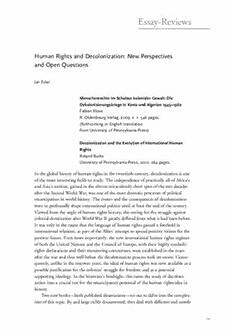
Human Rights and Decolonization: New Perspectives and Open Questions PDF
Preview Human Rights and Decolonization: New Perspectives and Open Questions
Essay-Reviews Human Rights and Decolonization: New Perspectives and Open Questions JanEckel MenschenrechteimSchattenkolonialerGewalt:Die DekolonisierungskriegeinKeniaundAlgerien1945–1962 FabianKlose R.OldenbourgVerlag,2009.x(cid:5)346pages. (forthcominginEnglishtranslation fromUniversityofPennsylvaniaPress) DecolonizationandtheEvolutionofInternationalHuman Rights RolandBurke UniversityofPennsylvaniaPress,2010.264pages. Intheglobalhistoryofhumanrightsinthetwentiethcentury,decolonizationisone ofthemostinterestingfieldstostudy.TheindependenceofpracticallyallofAfrica’s andAsia’snations,gainedinthealmostmiraculouslyshortspanofthetwodecades aftertheSecondWorldWar,wasoneofthemostdramaticprocessesofpolitical emancipationinworldhistory.Theeventsandtheconsequencesofdecolonization weretoprofoundlyshapeinternationalpoliticsuntilatleasttheendofthecentury. Viewedfromtheangleofhumanrightshistory,thesettingforthestruggleagainst colonialdominationafterWorldWarIIgreatlydifferedfromwhatithadbeenbefore. Itwasonlyinthe1940sthatthelanguageofhumanrightsgainedafootholdin internationalrelations,aspartoftheAllies’attempttospreadpositivevisionsforthe postwarfuture.Evenmoreimportantly,thenewinternationalhumanrightsregimes ofboththeUnitedNationsandtheCouncilofEurope,withtheirhighlysymbolic rightsdeclarationsandtheirmonitoringcommittees,wereestablishedintheyears afterthewarandthuswellbeforethedecolonizationprocesstookonsteam.Conse- quently,unlikeintheinterwaryears,theidealofhumanrightswasnowavailableasa possiblejustificationforthecolonies’struggleforfreedomandasapotential supportingideology.Inthehistorian’shindsight,thisturnsthestudyofdecoloni- zationintoacrucialtestfortheemancipatorypotentialofthehumanrightsideain history. Twonewbooks—bothpublisheddissertations—setouttodelveintothecomplex- itiesofthistopic.Byandlargerichlydocumented,theydealwithdifferentandmostly 111 complementarysubjects.FabianKlose’sHumanRightsintheShadowofColonialPower focusesontwocolonialwars:GreatBritain’ssuppressionoftheso-calledMau-Mau rebellioninKenyabetween1952and1956andFrance’swaragainsttheAlgerianinde- pendencemovementbetween1954and1962.Roughlyhalfofhisbookisdedicatedto theanalysisofcolonialviolenceandtheBritishattemptsatlegitimizingtheirbrutal warfare.Theseparts,consequently,arenotrelatedtohumanrightshistoryinthestrict sense.Theotherhalfdealswiththehumanrightspoliciesofboththemetropolitan governmentsandtheanticolonialmovements,drawingonarchivalmaterialfrom British,French,andUNrecords.RolandBurke’sDecolonizationandtheEvolutionof InternationalHumanRights,meanwhile,examinestheroleAfricanandAsiannations playedinthedevelopmentoftheUNhumanrightsregimefromitsinceptionin1946 throughthe1970s.Heconcentratesonfourkeymomentsoraspectsofthisdevel- opmentwhichheseesassymptomaticofbroadertrends:theconferenceofAfrican andAsiannationsinBandungin1955;theattitudestowardtherighttoself-determi- nationandtherighttopetition;theUNhumanrightsconferenceinTehranin1968; and,finally,theemergenceofthedoctrineofculturalrelativism. KloseandBurkeshareanumberofimportantassumptions.Bothconsiderthe ideaandthepoliticsofhumanrightsasakeyfeatureofthedecolonizationprocess. Ontheonehand,theyregardhumanrightsidealsasanessentialingredientofantico- lonialism.Klose,lookingatpoliticalactivistsinthecolonies,emphasizesthathuman rightsrhetoriccametoplayakeyroleinlegitimizingtheirstruggle.Burke,forhis part,stressesthefactthatduringthe1950sindependentAfricanandAsianstates stronglycommittedthemselvestothe‘‘universality’’ofthehumanrightsidea.Onthe otherhand,theauthorsseecolonialandpostcolonialpoliticiansasdecisiveactorsin theshapingofinternationalhumanrightspolitics,especiallyattheUnitedNations. Morespecifically,theyframeAfro-Asianinitiativesinthe1950sand1960sasapositive ‘‘contribution’’toapraiseworthyhumanrightsregime.Inthisway,atleastforthe roughlytwodecadesfollowingthewar,theytraceanessentiallypositiverelationship betweenhumanrightsandcolonialemancipation.Bothinterprethumanrightsasan expressionofprogressive,emancipatoryidealsandevenanimportantbasisforthe furtheringofindependenceandfreedom.Finally,anothersharedcharacteristicofboth booksisthattheystopshortofexaminingwhetherandtowhatextenthumanrights matteredforthedecisionofthecolonialpowerstoabandontheircolonies. Thetwostudiesmaynotadduptoacoherentnarrativebuttheydevelopelements ofaninterpretationwithwhicheveryfutureanalysiswillhavetoengage.Therefore, theyseemtoprovideafruitfuloccasionforareflectiononthehistoryofhumanrights indecolonization.Asyetthestillnascenthistoriographyonhumanrightshasnotpaid muchattentiontothedecolonizationprocessandauthorshavedealtwithonlyrather limitedaspects.Inresponse,itseemsvaluabletotakestocksystematically,examining theroleofhumanrightsforbothactivistsinthecoloniesandmetropolitanpowers, theusesoftheideaindifferentforums,andtheeffectsofhumanrightspoliticsfor theoverallprocessofdecolonization.Inpart,IbuildontheresultsKloseandBurke havereached,butIalsosuggestnewinterpretationsonthebasisofdifferentmaterial orbyhighlightingaspectswithwhichtheydonotdeal.Inaddition,sinceresearchon thetopicisstillfledglingitseemsusefultoraisesomeimportantquestionsthatwill 112 Humanity Fall2010 havetobeaddressedinfuturestudiesinordertofullyunderstandthemanyfacetsof humanrightsindecolonization. Withoutdisagreeingwithmanyoftheauthors’observations,inwhatfollowsI offeranessentiallydifferentlineofinterpretation.Broadeningthehistoricalfocus underlyingbothstudies,respectively,Iarguethatthehistoryofhumanrightsin decolonizationismorecomplexandambiguousthaneitheroftheaccountsmight suggest.Itshouldbestressedthatthishistoryisnotaterrainforeasyformulae;it hardlyseemsfittoprovidehistorianswitha‘‘grandnarrative,’’whetheroneofemanci- pationoroneofhopesbetrayed.Atthemostgenerallevel,whatcanbesaidisthatin theprocessleadingtotheendofcolonialism,humanrightswereneitherhighly significantnorcompletelyabsent.Theirinterestforthestudyofdecolonizationliesin betweentheseextremes.Thestoryofhumanrightsindecolonizationisthestoryof theiroccasionalimportanceandrelativeweight,ofexperimentalandshiftingstrat- egies,ambiguousappropriations,andlimitedeffects.Theirmeaningandinstrumen- talityweredifferentfordifferentactors,atdifferentpointsintime,andindifferent forums.Thismakesitnecessarytofocusonspecificcontextsandtolookforpartial explanations. Morespecifically,Iwillcontendthatlookingbeyondthoserelativelyfewinstances whereAfricanandAsianactorsdidrefertohumanrights,thenewinternational languageprovestohavebeenclearlymarginalintheirpoliticalproject.Furthermore, thoseactivistsandstatesthatdidbasetheirclaimsonhumanrightsdidnotsomuch expresstheircommitmenttouniversalnormsasappropriatethemfortheirspecific anticolonialpolicies.Tothem,humanrightsservedasalargelysporadicstrategyof legitimizingtheirstruggleagainstcolonialism.Thisstrategy,moreover,seemstohave beenmuchmoreimportantatthelevelofsupranationalcoalitionsthanintherhetoric ofindividualactivists.ByfarthemostimportantforumwastheUnitedNations,and bothKloseandBurkearequitecorrectinarguingthatpostcolonialactorsdecisively shapedUNhumanrightswork.AfricanandAsianinitiativesintheUNwere ambiguous,however,servingasahighlypoliticized,iflargelysymbolic,attemptto countertheglobalhegemonyofFirstWorldstatesandtorestructuretheinternational statesystem.Alltheseeffortsdidmakeadifferenceinmetropolitangovernments’ considerationsaboutwithdrawingfromthecolonies—butthedifferencewasslight. IntheBritishcase,indicationscanbefoundthatintheeyesofpolicymakersantico- lonialcriticismdidcometoaffecttheinternationalimageandthelegitimacyofthe Britishpositionintheworldandthusconstitutedafactorinthedecisiontoend colonialrule.However,thisoccurredatarelativelylatepointintimeandhuman rightsaccusationsneverformedadominantmotivationforcolonialretreat. Thisessaywilldiscussthreedimensionsofthetopicthatappeartobeparticularly important.Thefirstsectionattemptstoassessthesignificanceofhumanrightsfor anticolonialmovements.Theseconddealswiththepolicyofpostcolonialstatesinthe UnitedNations.Finally,thethirdsectionconsiderstheattitudeofcolonialpowers towardhumanrightsandanalyzestherolehumanrightsplayedintheendofcolonial rule.Bylookingatthesedifferentcontexts,Ihopetoprovideaninterpretationthatis inkeepingwithcurrentviewsofthedecolonizationprocessitself.Giventhevast dimensionsandenormouscomplexityofthedissolutionofcolonialempires,many Eckel:HumanRightsandDecolonization 113 historianshavecometopreferlimited,fractured,andcase-by-caseexplanationsover static,generalmodels,howevermulticausal.Inviewofthevariegatedcharacterand longdurationofdecolonization,itwouldindeedbesurprisingtodiscoverthathuman rightsplayedaclear-cutroleintheprocess. HumanRightsinAnticolonialMovements Inthe1940s,thecolonialpowerscommittedthemselvestoawiderangeofprinciples thatstoodinnotablecontrasttotheideaandpracticeofcolonialrule.Alreadyduring theSecondWorldWar,inanattempttomobilizeworldwidesupportand,notleast, toharnessthecoloniesforthewareffort,metropolitangovernmentsvowedtofight thewarforthepurposeoffreedom,democracy,andhumanrights.Aftertheendof thewar,theyformalizedtheircommitmentbysigningtheUniversalDeclarationof HumanRightsof1948andtheEuropeanConventiononHumanRightsof1950 (thoughFrancedidnotratifyituntilthe1970s).Intheory,thenewlyproclaimed principlesprovidedcolonialactorswithanewbasistojustifytheiraspirationstogain independence. BothKloseandBurkeusetheemergenceofhumanrightslanguageandtheestab- lishmentofinternationalrightsregimesasstartingpointsfortheirstudies.Inthefirst chapterofhisbook,Klosearguesthatintheearly1940sactivistsinthecoloniesbegan toseizeupontheAlliedpromisesforthepostwarfuture,humanrightsfiguringpromi- nentlyamongthem(29–45).Inparticular,theyreferredtotheso-calledAtlantic CharterofAugust1941,originallyapressstatementfollowingthemeetingbetween FranklinDelanoRooseveltandWinstonChurchill(andsubsequentlyinterpretedby bothindifferentandmutuallyexclusiveways).1Klosecitesaconsiderablenumberof politicalleaders,suchasNelsonMandela,CarlosRo´mulo,NnamdiAzikiwe,Kwame Nkrumah,andFerhatAbbas,whodemandedthattheCharter’sprinciplesbeputinto practice. Theseactivistswerecertainlyimportantexponentsofanticolonialthoughtand KloseisquitecorrectinarguingthattheAtlanticCharterturnedintoacentral referencepointforanticolonialism.However,thiswasnotduetotheideaofhuman rights,atermwhichtheCharterdidnotevenmention.Rather,whatsparkedthe enthusiasticreceptioninthecolonieswasthefactthattheCharterexplicitlystatedthe principleofself-determination.Byspeakingofself-determination,theAlliedleaders reactivatedapromisethathadbeenprominentinthesubjectedregionsoftheworld sincetheendoftheFirstWorldWar,whenU.S.presidentWoodrowWilsonand BritishprimeministerDavidLloydGeorgehadfirstgivenitinternationalsalience.2 ManyoftheactivistsinthecolonieswhonowheraldedtheAtlanticCharterdidso preciselybecauseitseemedtoconfirmandtofinallyfulfillthehopesthathadbeen harboredformorethantwentyyears.Significantly,inhis‘‘PoliticalBlueprintof Nigeria’’NnamdiAzikiwe(whowastobecomethefirstpresidentofindependent Nigeria)referredtoboththeAtlanticCharterandWilson’sFourteenPoints.Arguing that‘‘politicalautonomyisthesummumbonumofpoliticalexistence,’’heusedboth documentstolegitimizehisdemandforthe‘‘rightofallpeopletochoosetheformof governmentunderwhichtheymaylive.’’3Atthetime,self-determinationhadnotyet beenformulatedasahumanrightandnoteventhelandmarkUniversalDeclaration 114 Humanity Fall2010 includeditexplicitly.4Itwasonlylaterthattheprinciplewasdefinedasanelement ofthehumanrightsideaand,aswillbearguedbelow,thiswastobeoneofthe primarywaysdecolonizednationsappropriatedtheinternationalhumanrights regime.Tostressthedistinctionbetweenself-determinationandhumanrightsisnot amatterofsemantichairsplitting.ParticularlysinceKloseisnottheonlyauthor equatingbothideas,itseemsimportanttorecallthatintracingthegenesisofinterna- tionalhumanrightslanguagehistoriansshouldbecarefulnottoprojectbackthe ampleunderstandingofhumanrightsthatwehavecometobefamiliarwith.5 NotonlydoestheAtlanticCharternotillustratetheprominenceofhumanrights languageinanticolonialthought.Acloseandcomprehensivereadingofpolitical writingssuggeststhatitneverturnedintoananticolonialideologyorevenintoan importantrhetoricatall.6Theroleofhumanrightsinanticolonialthoughtisa questionofproportions.Itistruethatinthevastnumberofanticolonialpamphlets numerousauthorscanbefoundwhoatonetimeoranotheradoptedtheterm‘‘human rights.’’However,theyareoutweighedbythesheermassoftextsthatdonotmention itatall.Manymorepoliticalactivistscouldbecitedwhosimplydidnotreferto humanrights,includingfiguresasdifferentasthefirstIndianpresident,Jawaharlal Nehru,theVietnameseresistanceleaderHoChiMinh,SekoToure´,theGuinean exponentofMarxistauthoritarianism,orLe´opoldSe´darSenghor,theSenegalese philosopher-statesmanwhodevelopedtheconceptofanAfricanculturalidentity.7At thelevelofsupranationalcoalitions,particularlyinthenonalignedmovementandin Pan-Africanism,humanrightsassumedagreaterimportance.Thesemovements’use oftheconceptwassurprisinglyshort-lived,however.Thus,theoverallpicturebelies theassumptionthatthenewinternationallanguagecametooccupyacentralplacein thestruggleforindependence. Tobeginwith,theideologicalconceptionsofAfricanandAsianactivistsconsisted ofextremelyheterogeneousideasandplans.Politically,theyrangedfromparlia- mentarydemocracytocommunismandfrom‘‘AfricanSocialism’’to‘‘forceddevel- opment.’’Therewashardlyanythingonwhichleadersoftheanticolonialstruggledid notdisagree,whetherthequestionofwhich‘‘Western’’valuesshouldbeadoptedand forwhatpurposes,thequestionofviolenceasameansofliberation,theshapeoftheir countries’postindependencerelationstothecolonialpowers,futureintra-Africanrela- tionsasarticulatedin‘‘Pan-Africanism,’’orthepaceandpriorityofeconomicdevel- opment.Inthisbewilderingme´langeofideas,sharedbeliefswereratherfew.Since theonlyreferencepointallauthorshadincommonwasthefairlyabstractnotionof the‘‘colonialexperience,’’agitationagainstcolonialdominationessentiallyrestedon anegativeconsensus.Morethananythingelse,theideologyofAfricanandAsian movementswasan‘‘anti-ideology,’’creatingasenseofcoherencebyemphasizingwhat wastoberejected.Consequently,anticolonialism,anti-neocolonialism,anti-imperi- alism,anti-racism,anti-discrimination,andanti-apartheidweretheforemostpolitical catchwordsofthespeechesandpamphlets,providingtheanticolonialmovementwith whatlittleunityithad. Itwasentirelyconsistentwiththisideologyexnegativothatthose‘‘positive’’objec- tivesfiguringprominentlyinanticolonialwritingswerefewandgeneralincharacter. Essentially,theyamountedtovaguecountervisionsofcolonialsubjugation.Threeof Eckel:HumanRightsandDecolonization 115 themwereparticularlyimportant:theaimofnationalindependenceandfreedom,the principleofself-governmentorself-determination,andtheideaofracialequality.The projectofeconomicdevelopment,eventhoughfrequentlyproclaimedinthe pamphlets,appearstohavebeenlessconsensual.Finally,nationalunity,another prominentpropagandisticclaim,wasareflectionofethnicandculturaldiversityrather thanofcolonialrule,usedtomobilizealldifferentgroupswithinthecolonies.Even thoughtheyclearlydidnotprovideaconsistentpoliticalprogram,theseprinciplesat leastconstitutedwidespreadandfrequentlyvoiceddemandsonwhichmostactivists couldagree. Inconnectionwiththeseobjectives,thelanguageofrightsdidplayanotablerole. Politicalleadersbrandishedcolonialismasthedenialofrightsandtheyinsistedonthe ‘‘right’’toself-determination,sovereignty,orindependence.PatriceLumumba’s apodicticclaimin1958thatCongoleseindependencecouldnot‘‘beconsideredby Belgiumasagift;onthecontrary,itisaquestionoftheenjoymentofarightthatthe Congolesepeoplehavelost,’’wasonlyoneofmanythatusedasimilarrhetoric.8This wasageneralrightsdiscourse,however,thathadbeencirculatinginthecoloniesfor somedecades,asBonnyIbhawohhassuggested,andneitherreferredtotheterm ‘‘humanrights’’nortotheUNdeclarationsandinstitutions.9 Lookingatthosegroupsandactivistswhodidexplicitlyrefertohumanrightsand examiningtheconcretepoliticalusetheymadeofit,thepicturebecomesevenmore complex.Activistswerefarfromapplyinghumanrightsinauniformway.Themost consistentadvocateofahumanrightsideathatcloselymatchedtheprinciples enshrinedintheUNhumanrightssystemwasAzikiwe.Alreadyin1943,hedrafteda ‘‘FreedomCharter’’thatincludedacomprehensivecatalogofrights,includingthe righttolife,freedomofopinionandofassociation,therighttoeducationandto health,andtherighttoself-determination.Inlateryears,Azikiwepersistentlycriti- cizedthedenialoffundamentalhumanrightstoAfricans,frequentlyreferringtothe UniversalDeclarationof1948.Furthermore,heworkedoutthevisionofademocratic Nigeria,ofwhichhumanrights,mainlyspelledoutasbasicpoliticalrights,formed anintegralpart.Finally,heevenplannedtheoutlinesofaPan-Africanunionwhich, amongothers,wouldbebasedonahumanrightsconvention.10 Nevertheless,withhisconceptionofhumanrightsAzikiwewasasingularfigure, anexceptionevenamongexceptions.11Muchmoretypicaloftheanticolonialseizures wasanoccasionalusethatdidnotmakehumanrightsthecenterpieceofthepolitical rhetoric.InJuliusNyerere’sspeeches,forinstance,humanrightshadshifting meanings,underscoringthedemandforsuffrageindependentofincome,oralterna- tivelyexpressingthenotionofajustruleoflaw.Mostimportantly,Tanganyika’sfirst presidentdefinedhumanrightsasacommitmenttotheequalityofmenandraces.12 Attimes,boththeembraceandtherejectionofthehumanrightsideacoexistedin thepoliticalthoughtofoneauthor.ThefirstGhanaianpresident,KwameNkrumah, occasionallystrengthenedhisclaimsbyreferringtotheUniversalDeclaration,even thoughmoreoftenhedistancedhimselffromtheideasitexpressed.13 TheveryexampleofNkrumahpointstothefactthatattheradicalendofthe spectrum,anticolonialactivistsdenouncedhumanrightsandrelatedprinciplesas hypocriticalordecadent‘‘Western’’values,repudiatingthemasguidelinesforthe 116 Humanity Fall2010 postcolonialfuture.NkrumahhimselfderidedWesternpoliticiansforthefactthat they‘‘broadcasttheneedtorespectfundamentalfreedoms,therightofmentolive freefromtheshadowoffears[,thatthey]proclaimedtheAtlanticCharterandthe CharteroftheUnitedNations,andthensaidthatallthesehadnoreferencetothe enslavedworld.’’14Similarly,FrantzFanon,theprophetofviolentresistance,ridiculed thebeliefinhumanrightsrhetoricasacontemptiblearrangementwiththecolonial oppressor:‘‘Theentireactionofthesenationalistpoliticalpartiesduringthecolonial periodisactionoftheelectoraltype:astringofphilosophico-politicaldissertationson thethemesoftherightsofpeoplestoself-determination,therightsofmantofreedom fromhungerandhumandignity,andtheunceasingaffirmationoftheprinciple‘One man,onevote.’Thenationalpoliticalpartiesneverlaystressuponthenecessityofa trialofarmedstrength,forthegoodreasonthattheirobjectiveisnottheradical overthrowingofthesystem.’’15 Amorevisibleandmoreconsistentuseofhumanrightscanbeobservedatthe levelofsupranationalcoalitionsandininternationalforums,whereAfricanandAsian statessoughttoarticulatecommoninterestsinthehopeofincreasingtheirweightin theinternationalarena.Itwasherethatpostcolonialnationsusedthestrategyof anticolonialappropriationmostprominently.Theydidsopreciselybydefiningtheir centraldemandsofself-determinationandracialequalityashumanrights.However, thiswasonlyonestrategyamongothersinthefightforindependenceandamore importantroleininternationalrelations;outsidetheUnitedNationsitwasnever appliedmorethantentatively.Thistentativeembracehastobeseenaspartofamore general‘‘subaltern’’logicwithwhichpoliticalandsocialgroupsinthecoloniesused metropolitandiscoursesinordertoemploythemagainstthecolonialpowersand demandthatthelatterpracticewhattheypreach.16Theseattemptscanbeobservedin thefieldoflaborlegislationjustasmuchasindiscussionsaboutcitizenshiporfreedom ofmovement.Inthesameway,thelanguageofdevelopmentcanbeviewedasa strategyofappropriationandassuchprobablyfilledamoreimportantrolethanthe referencetohumanrights.17 Thenonalignedmovement,whichwasthemostimportantandlong-livedofthe supranationalcoalitions,providesacaseinpoint.Thismovementwasalooselyorga- nizedplatformcoordinatingavastarrayofAfrican,Asian,andArabstates.Their meetingsaimedatestablishinga‘‘thirdforce’’ininternationalaffairs,drawinginterna- tionalattentiontotheneedsofthepostcolonialworldandarticulatingtheirpositions onworldpolitics.18Thenonalignedmovement(callingitselfAfro-Asiansolidarity movementatthetime)madeitsfirstappearanceatawidelynoticedconferenceat Bandungin1955andsubsequentlymetatregularintervals. RolandBurkeusestheBandungconferenceasakeyexampleofthestrong commitmentAfricanandAsiannationsinthe1950sand1960sdisplayedtowardthe ideaofhumanrights(1–35).Fromthevariousinvocationsoftheterminconference speechesandfromtheofficialrecognitionoftheUniversalDeclarationofHuman Rightsasa‘‘commonstandardofachievement,’’heconcludesthatBandungmarked the‘‘highpointinsupportfortheuniversalityofhumanrightsamongtheThird Worldstates’’(14–15).However,Burkewhootherwiseiscarefultodifferentiate betweenthevarioususesandmeaningsofthehumanrightsidea,seemstotakethe Eckel:HumanRightsandDecolonization 117 Bandungrhetorictoomuchatfacevalue.Hefocusesexclusivelyonthe‘‘universal- istic’’notionsintheproceedings.Thus,hisinterpretationoftheearlyrelationship betweendecolonizationandhumanrightslosessightofboththeoverallplaceof humanrightsattheconferenceanditsmanifestpoliticalinstrumentalization.Tobegin with,Bandungwasnotahumanrightsconferencebutratheraformativegathering dealingwithabroadrangeofcurrentworldproblems.‘‘HumanRightsandSelf- Determination’’constitutedonemajortopicamongseveral,othersbeingeconomic cooperation,theproblemsofdependentpeoples,orworldpeace.Moreimportantly, thedelegationsinfusedhumanrightswithaspecificmeaning.Theyplacedparticular emphasisontheprincipleofself-determinationas‘‘apre-requisiteofthefull enjoymentofallfundamentalHumanRights’’anddenouncedracialdiscrimination andcolonialruleasviolationsofhumanrights.Noneofthesehadbeenprominent claimsinthehumanrightscontextatthetime,notevenattheUnitedNations.Thus, byreferringtogenuinelycolonialexperiencesandframingtheminthenewinterna- tionallanguage,Bandungprovidestheclearestexampleoftheattempttoredefinethe humanrightsideaandshapeitaccordingtoanticolonialprinciples. Furthermore,itshouldnotbeoverlookedthatBandungconstitutedonlyabrief moment.Atthesubsequentnonalignedsummitsinthe1960sand1970s,humanrights clearlyrecededtothebackground.Conferencedocumentsalmostexclusivelyapplied thetermtodenouncecurrentcasesofwhatwasconsideredtobecolonialsuppression, specificallydirectingitagainstSouthAfrica,Israel,Portugal,andtheUnitedStates foritspolicyinIndochina.19Toaverylargedegree,thenonalignedmovementwas andremainedananticolonialplatform.Inthiscase,too,thenegativeconsensusof opposing(neo-)colonialism,imperialism,andforeigndominationprovedtobethe onlyelementholdingtogethertheotherwiseunlikelycoalitionofculturallydiverse andpoliticallyheterogeneouscountriesvastlydifferingintheireconomiclevels.Even thetwoothermainconceptsthatthenonalignedmovementcontributedtothe discussionaboutworldaffairs—peaceanddevelopment—remainedcloselylinkedto thecolonialexperience.Themovementsawtheendofcolonialismasanessential preconditionforapeacefulworldorderanditregardeddevelopmentalpoliciesasa strategyofovercomingtheeconomicinequalitiesresultingfromcolonialismand neocolonialism.Humanrightsreappearedonlyin1979,asareactiontotherapidly increasingimportancethatthetermhadbeengainingintheWesterninternational politicsofthedecade.20Nowthenonalignedmovementframeditsconcernfor economicdevelopmentinthelanguageofhumanrights,inamovethatparalleledthe effortsofAfricanandAsianstatesintheUnitedNationsatthetime.21Thus,justas atBandungearlier,themovementsoughttoappropriatehumanrightsforitsspecific politicalproject.However,bynowtherelationshiptotheconcepthadgrowneven moreambiguous.Thiswasmanifestedinthefactthatthe1979conferenceharshly criticizedwhatdelegatesregardedastheWesternstates’attempttousehumanrights accusationsforinterventionintothedomesticaffairsofThirdWorldcountries.22 ThetrajectoryofthePan-Africanmovement,thesecondprominentsupranational coalition,largelyconfirmstheseobservations.RevivedattheendoftheSecondWorld War,themovementremainedlargelydormantbeforethelate1950s,whenfinallyit tookanumberofinitiatives.Theyear1958turnedouttobetheannusmirabilisof 118 Humanity Fall2010 humanrightsinthePan-Africancontext.23AttheConferenceofIndependentStates, theconferenceofthePan-AfricanMovementofEastandCentralAfrica,andtheAll- AfricanPeoples’Conference,allheldbetweenAprilandDecember,referencesto humanrightsandtheUniversalDeclarationabounded.Again,theanticolonialand antiracialistappropriationspredominatedinthevariousspeeches,resolutions,and finalacts.However,theembraceofhumanrightsprovedtobeevenmoretransitory thaninthecaseofthenonalignedmovement,asthefollow-upconferencesdidnot evenusethetermforthemanyaccusationsofcolonialrepressionandthenumerous demandsfornationalfreedom.Theconferencesofthe1960swereshapedbythefact thatanincreasingnumberofstateswereonthethresholdofindependenceorhad alreadyattainedit.Accordingly,theprinciplesofnonintervention,territorialintegrity, andeconomicandculturalcooperation,mostofthemsittinguneasilywithhuman rightsnorms,tookcenterstage.24Finally,theseprioritieswerealsomirroredinthe structureoftheOrganizationofAfricanUnity(OAU),theintergovernmentalorgani- zationfoundedin1963.TheOAUdidnotadoptadeclarationofhumanrights.Even thoughtheCharteroftheOAUdidcontainareferencetotheUniversalDeclaration ofHumanRights,itmainlystipulatedthesovereignrightsofthememberstates: nonintervention,territorialintegrity,nationalindependence,sovereignequality,and freedomforstill-dependentterritories.25Inlinewiththeseprinciplesthepractical workoftheOAUinthenextdecadeandahalfturnedouttobeextremelypassive, thestruggleagainstPortuguesecolonialismandapartheidremainingatthefore.The organizationintervenedonlyoccasionallyininternalconflicts,andonlywhenthey threatenedregionalstability,suchasintheCongocrisisin1964–65,theNigeriancivil warbetween1967and1970,andtheAngolancivilwarin1975–76. Thus,alookatthebroaderpicturerevealsthateventhoughnotcompletelyabsent, humanrightsrhetoricinmostcontextsservedasarathermarginalandsporadic strategyofanticoloniallegitimation,astrategythatmoreoverwasnotfreeofambigu- ities.TheoneimportantexceptionwastheUnitedNations.TheUNconstitutedthe onlyforuminwhichhumanrightsacquiredapersistentlyhighimportanceforAfrican andAsianstates.Itwasonlyherethattheyinvestedconsiderableresourcesand energiesintoinfluencinginternationalhumanrightspolicies.Consequently,African andAsianpoliciesintheworldorganizationmeritcloseattention,astheyseemtobe crucialforexplainingtheroleofhumanrightsindecolonization. AnticolonialismandHumanRightsattheUnitedNations TheinstitutionalpreconditionfortheAfro-AsianattemptatinfluencingtheUN humanrightsworkwasahugeinfluxofnewlyindependentstates.Between1955and 1965,almostfiftyformercolonialterritoriesenteredtheworldorganizationas members,providingpostcolonialcountrieswiththemajorityofvotesintheGeneral Assembly.Thischangeinmembershipundoubtedlymarkedthemostprofound caesurainthehistoryoftheorganizationuptothatpoint. BothKlose(46–61,275–89)andBurkeagreethattheUnitedNationswasan importantinstitutionalframeworkfortheanticolonialstruggle,notleastbecauseit enabledAfricanandAsiannationstoregularlyvoicepubliccriticismofcolonialism. Inaddition,bothauthorsconvincinglyarguethatpostcolonialstatesdominatedthe Eckel:HumanRightsandDecolonization 119 UNhumanrightsworkandwereinapositiontosignificantlyshapetheagendain the1960sand1970s.Inparticular,theAfro-Asianhegemonymanifesteditselfinfour areas.First,itwasthedrivingforcebehindthesaliencegiventotherighttoself- determinationinvariouscontexts.Moreover,theAfro-Asianinitiativeandvoteswere crucialinbringingabouttheadoptionoftwosignaldocuments,theDeclarationon theGrantingofIndependencetoColonialCountriesandPeoplesin1960andthe ConventionontheEliminationofRacialDiscriminationin1965,bothestablishing newcommitteestomonitorinfractions.Finally,postcolonialstatesengagedina persistent,decades-longstruggleagainstapartheidthatstronglycontributedto isolatingSouthAfricaintheinternationalarena.Byhighlightingthesedevelopments intherealmofhumanrights,bothbookssubstantiateanddifferentiateearlierassess- mentsoftheeffectsofdecolonizationontheUnitedNations,mostnotablythe accountofEvanLuard,whohascalledthedecadeafter1955the‘‘AgeofDecoloni- zation’’intheUN.26Burke’sbook,inparticular,providesthefirstdetailedstudyof AfricanandAsianstates’policyintheUnitedNations,coveringtherelativelylong periodfromthelate1940sthroughthe1970s. Inhisinterpretationofpostcolonialhumanrightspolicyinthe1950sand1960s, Burkeemploysadiscourseof‘‘contributions’’and‘‘achievements,’’characteristicnot onlyofhisbookbutofawholestrandofrecenthumanrightshistoriography.27This discourseleadshimtoframeAfricanandAsianinitiativesaspositivestepsindevel- opingtheUNhumanrightsregimeinasmuchastheydevelopeditatall.Inhisthird andfourthchaptersdealingwiththerightofpetitionandtherighttoself-determi- nation,respectively,everyrightcodifiedandeverycommitteeestablishedasaresult ofAfro-Asianproposalsappearsasavaluableadditiontothehumanrightssystem. Thisperspectivefallsshortnotonlybecausetheclaimthata‘‘CommissiononHuman Rightsthatdevotedtoomuchtimetodebatingapartheidwasbetterthanonethat debatednothing’’appearstobeapersonalorpoliticaljudgmentratherthana historicalone(147).Inaddition,thisinterpretationfailstoconceiveoftheUnited Nationsorganizationasthepoliticalarenaitactuallywas:anarenainwhichallinitia- tivesfollowedadecidedlypoliticallogicandsprangfromcomplexstateinterests.28It isatthispointthattheclearlylimitedempiricalfocusofthebook,whichisalmost exclusivelybasedonofficialUNrecords,moststronglycomestothefore.Eventhough understandableforpragmaticreasons,thedecisionnottousearchivalmaterialreduces theanalysistoofficialpositionsandpublicspeeches.Onthisbasis,thepolitical motivesandaimsbehindthehumanrightsinitiativescanonlybeinferred.(Burke doessobycontextualizingthepubliclyvoicedpositionsofAfricanandAsiandelega- tionswiththepoliticalsituationintherespectivecountries.) Atanyrate,thestoryoftherighttopetitiondemonstratesthatwhatBurkeregards as‘‘contributions’’inrealitywereexpressionsofshrewdpoliticalcalculation(59–91). AsBurkeshows,AfricanandAsianstatessupportedtheideaofindividualpetitions fromtheearly1960sonafterthegreatpowershadblockeditintheUNCommission onHumanRightsinthe1950s.Thereby,theygaverisetotheestablishmentofpetition mechanismsintheSpecialCommitteeof24monitoringtheDeclarationonthe GrantingofIndependence,theSpecialCommitteeonApartheid,andunderthe ConventionontheEliminationofRacialDiscrimination.Moreover,theAfro-Asian 120 Humanity Fall2010
